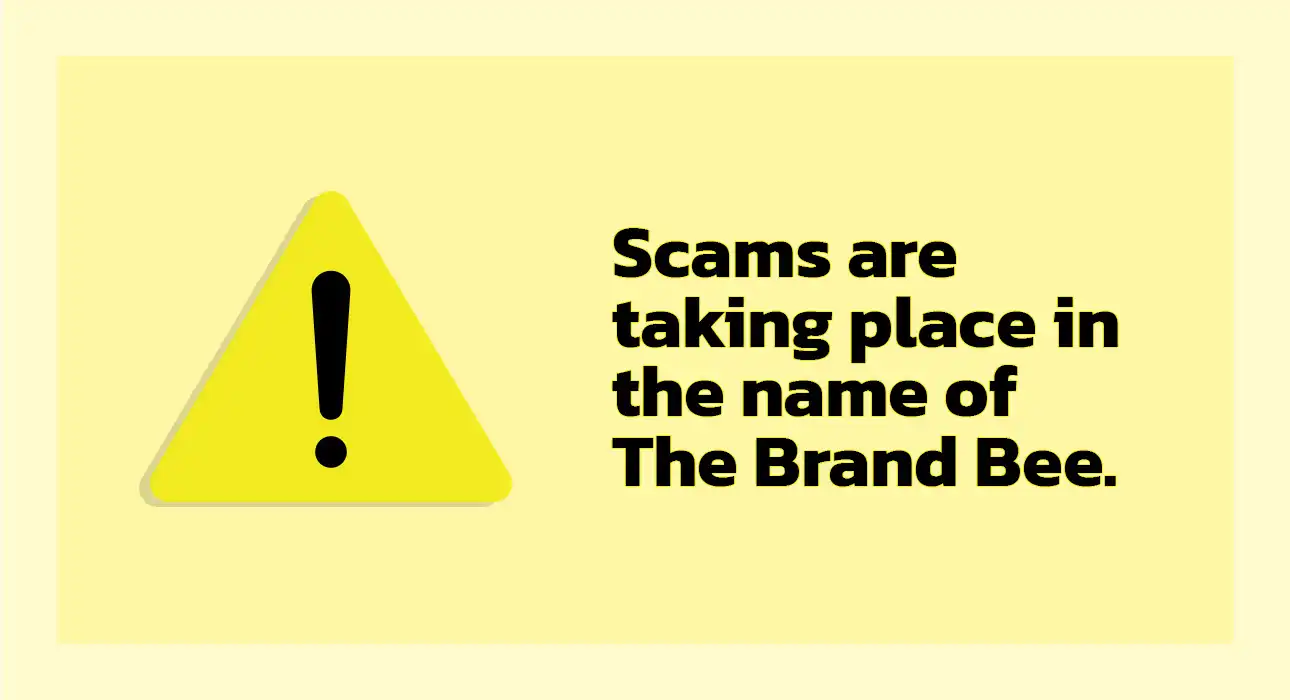19/09/2023
Beware of Digital Marketing Fake Job Offers: Protect Yourself from Scams

Recently, it has come to our attention that unscrupulous individuals have been using The Brand Bee's name to deceive and entice unsuspecting individuals into fraudulent schemes. These scammers have even gone to great lengths, creating fake Brand Bee ID cards and employing various tactics to create an illusion of authenticity to deceive their targets.
Under the guise of these counterfeit credentials, they lure individuals with false job offers that typically involve tasks such as posting reviews and work from home job opportunities. The allure of these deceitful opportunities lies in the promise of payment upon the submission of screenshots of completed tasks. However, it is of utmost importance to emphasize that The Brand Bee and its dedicated employees are in no way associated with such malicious activities.
The Trending Job Scam Fraud
In today's digital age, where remote work opportunities abound, job seekers are navigating an increasingly complex landscape. While the allure of digital marketing careers continues to grow, so does the shadow of online employment scams. This blog is your shield against the rising tide of job scam frauds. Here, we'll empower you with the knowledge to recognize these scams, arm you with tips to avoid falling prey to them, and unequivocally affirm that The Brand Bee has no involvement in such deceitful activities.
Before delving into the details of how to protect yourself from digital marketing job scams, let's take a moment to understand the scope and scale of this issue. Job scams have been on the rise in recent years, with scammers becoming increasingly sophisticated in their tactics.
Source:
Job Scams Are on the Rise, Here’s How to Protect Yourself (bestcolleges.com)
-
Employment scams result in approximately $2 billion in direct losses each year, according to the Better Business Bureau.
-
In the first quarter of 2022, approximately 14 million individuals encountered job-related scams.
-
The Federal Trade Commission reports that unsuspecting job seekers suffered $68 million in losses due to fraudulent business and job opportunities.
-
Job scam reports for early 2023 have nearly tripled in comparison to the same period last year.
-
Losses totalling $840,000 occurred in the first three months of 2023, surpassing the total losses reported during the first nine months of 2022.
-
Among individuals aged 18-34, job fraud stands as the most common type of scam.
-
Since 2020, more than 700 Scam Tracker reports cited Indeed, 288 referenced LinkedIn, and 250 mentioned Telegram as their initial point of contact with fraudsters.
How to Recognize If It's a Scam
Recognizing a job scam is the first line of defence against falling prey to fraudsters. Here are some telltale signs that should raise red flags:
-
Too Good to Be True: If a job offer appears too good to be true, it probably is. Be wary of job postings that promise exorbitant salaries for minimal work.
-
Poorly Written Emails: Scammers often have poor grammar and spelling in their communication. Genuine job offers are usually well-written and professional.
-
Unsolicited Job Offers: Be cautious of job offers that come out of the blue, especially if you didn't apply for the position.
-
Requests for Personal Information: Legitimate employers don't request sensitive personal information, such as your Pancard number or bank details, in the early stages of the hiring process.
-
No Clear Job Description: If the job posting lacks detailed information about the role, responsibilities, and company, it's a potential scam.
Tips to Avoid Falling for These Scams
Now that you know what to look for in a job scam, here are some tips to help you avoid falling victim to these fraudulent schemes:
-
Research the Company: Conduct thorough research on the company offering the job. Check their website, reviews, and social media profiles to ensure they are legitimate.
-
Verify Contact Information: Confirm the contact details provided in the job offer. Legitimate companies will have official email addresses and phone numbers.
-
Trust Your Instincts: If something doesn't feel right or if you have doubts about a job offer, trust your instincts and proceed with caution.
-
Never Pay for a Job: Legitimate employers do not require you to pay for a job. If you're asked to pay for training, materials, or any other reason, it's likely a scam.
-
Use Trusted Job Boards: Stick to reputable job search websites and platforms when looking for job opportunities.
What to Do If You Have Been a Victim of This Scam
If you suspect that you've fallen victim to a job scam, take immediate action to protect yourself:
-
Cease Communication: Stop all communication with the scammer to avoid further manipulation.
-
Report the Scam: Report the scam to your local law enforcement agency, the FTC, and the Better Business Bureau (BBB).
-
Notify Your Bank: If you shared any financial information, contact your bank to secure your accounts.
-
Change Passwords: Change passwords for your email, social media, and financial accounts to prevent unauthorized access.
The Brand Bee Is Not Involved in Any Such Activities
We want to make it abundantly clear that The Brand Bee and its employees are not engaged in any such activities. We do not solicit job applications through unsolicited emails, and we do not require applicants to complete tasks with the promise of payment. Any communication claiming to be from The Brand Bee offering such opportunities is fraudulent and should be treated with extreme caution.
Job scams in the digital marketing industry are on the rise, and it's crucial to remain vigilant and informed to protect yourself from falling victim to fraudsters. Always research potential employers, trust your instincts, and never share sensitive information or make payments in exchange for a job. And remember, The Brand Bee is not involved in any such activities, so be cautious of any emails or offers claiming otherwise. Stay safe in your job search and help spread awareness to protect others from falling into the same traps.








.jpg)